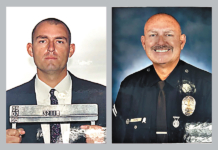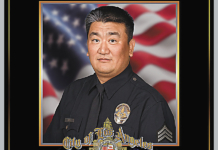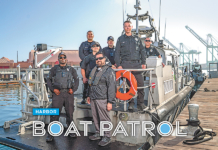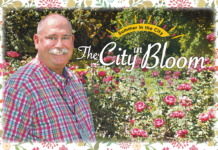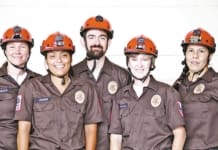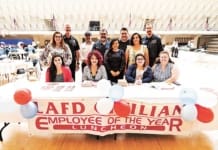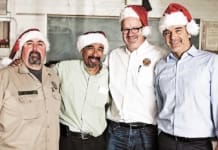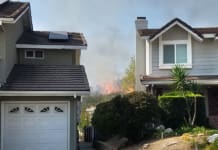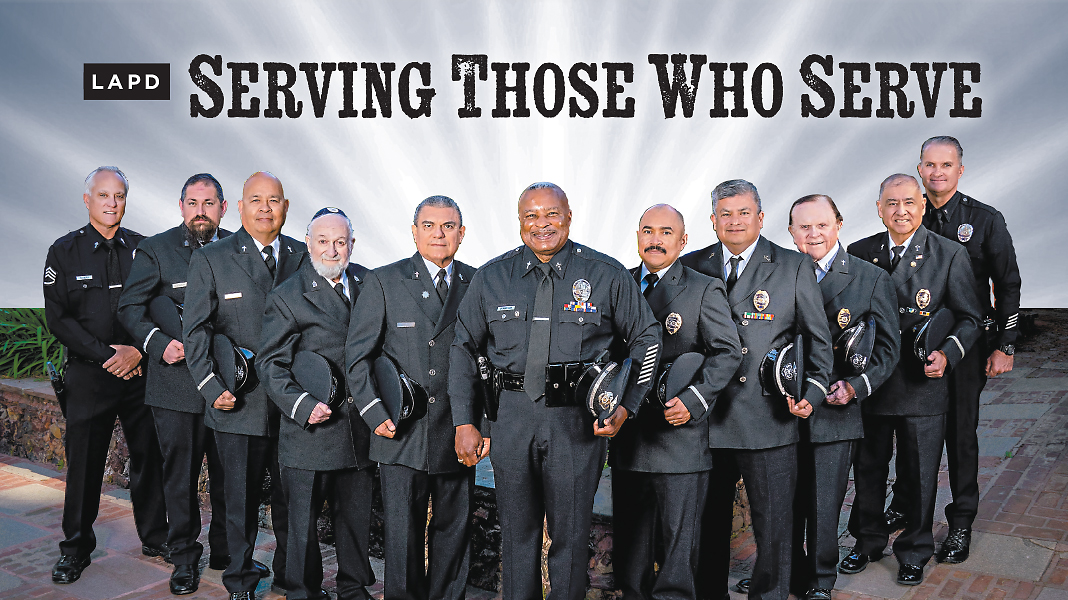
T
he Officers of the LAPD help citizens on their toughest days.
But who helps LAPD Officers on their toughest days? That would be the Chaplain Corps, a team of 50 religiously trained men and women – some are sworn, most are civilian – who step in to help the Officers and their families deal with sometimes tragic events that cut to the heart of being human. The Chaplains can be, and sometimes are, lifesavers.
All Chaplains volunteer their time to serve those who protect and serve. The Chaplain Corps is dedicated to providing for spiritual, moral and personal needs and support all Department personnel and their families. Chaplains attend roll calls, join Officers on patrol and spend hours each month at police stations, just to be present and contribute the closeness it brings.
Faiths, including Christian, Jewish, Muslim and Daoist, are represented. Chaplains must be certified in their faith traditions and undergo background investigations before they can be accepted into the LAPD Chaplain Corps, and then go through an extensive training program once they are accepted. Training sessions are every quarter thereafter.
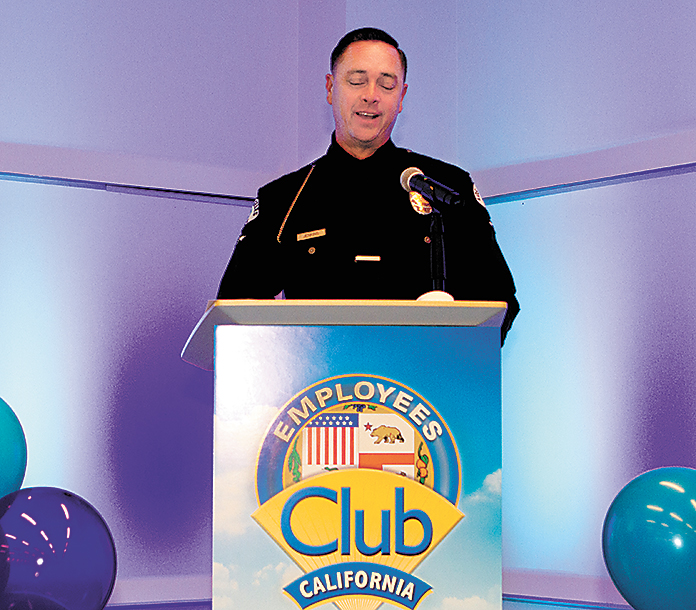
Police Officers face great levels of stress in their jobs, which makes mental health services crucial components of Officers’ wellness. Chaplains serve as support systems for those on the front lines and their families. They also serve ceremonial duties, including weddings and funerals. For the first time, the Club enjoyed the presence of an LAPD Chaplain, Officer Dan Jenkins, South Traffic, who delivered a prayer of invocation and a closing benediction.
This is Alive!’s first in-depth profile of the critically important LAPD Chaplain Corps. We are grateful for their service to LAPD’s Finest. We thank Chaplain Coordinator Officer III Mike McCarty and Chaplain Kenneth Crawford for their great assistance in producing this feature, and for working around their busy schedules during the Christian Holy Week and Easter season. •

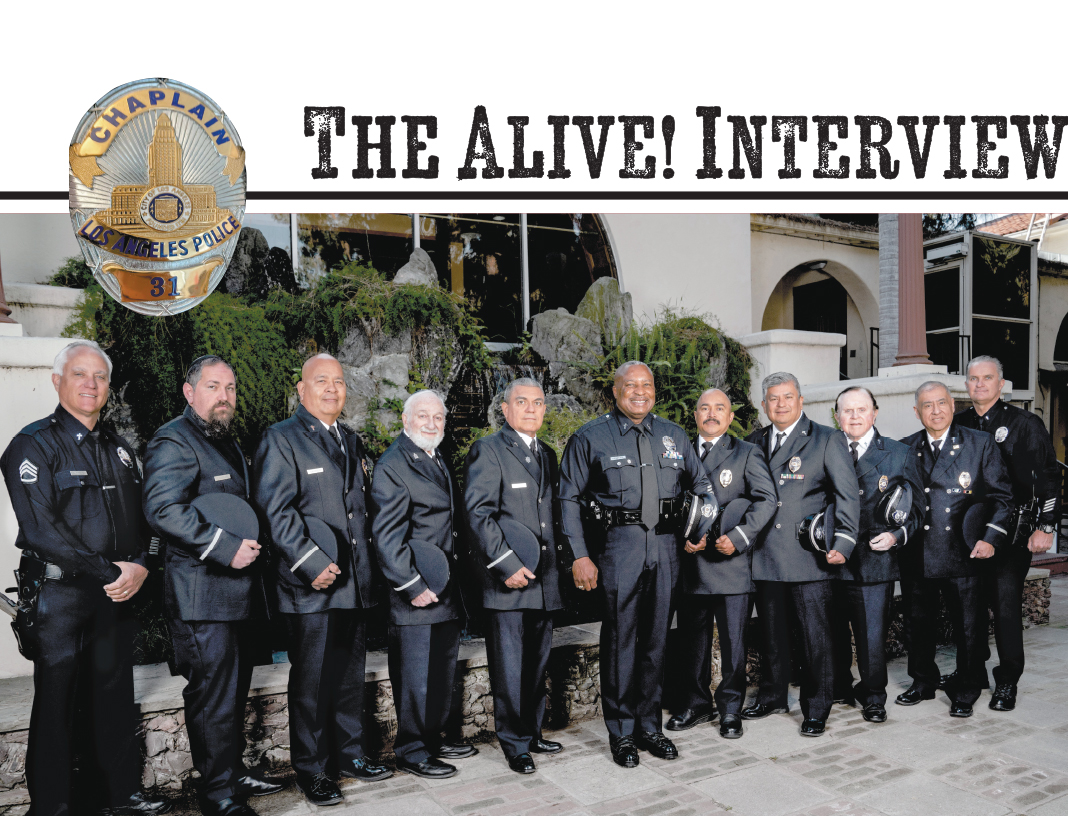
On Feb. 28, Association CEO Robert Larios and Alive! editor John Burnes interviewed five members of the LAPD’s Chaplain Corps. Those interviewed were:
-
- Chaplain Kenneth N. Crawford, Retired Officer, and a current Reserve Officer, Level I, LAPD. Chaplain Crawford is President of the Chaplains Advisory Board, which has spiritual oversight for the Los Angeles Police Dept.; Club Member;
- Chaplain Sgt. Eric Rogers, Metropolitan Mounted Unit, Vice President of the Chaplains Advisory Board, 30 years of City service;
- Chaplain Fr. Michael Cooper, Retired, LA County Sheriff’s Deputy, 20 years of County service; and an ordained Anglo Catholic priest assigned as Chaplain at Rampart and Transit Services Divisions;
- Officer III Michael McCarty, Chaplain Coordinator, Employee Assistance Unit under the Training Bureau, 29 years of City service; Club Member; and
- Chaplain Rev. Dr. Henry Ellis, civilian, Retired after having served the City in Rec and Parks, LADWP, Airports and General Services; 30 years of City service; Club Member.
The interview was conducted via Zoom.
Thank you all for joining us in your busy season, Lent, leading up to Holy Week and Easter. Tell us about the Chaplain Corps and how it works.
Officer III Michael McCarty: Sgt. Richard Suviate is my boss in the Employee Assistance Unit under the Training Bureau.
I’m in charge of all the Chaplains. I coordinate their background investigations and their interview process with the Advisory Board. I am also essentially the hub, so every time a Chaplain’s services are needed, they will call me through the Department Operation Command Center, and I will assign a Chaplain or Chaplains to whatever is needed, whether it’s an invocation, benediction, emergency, death, hospitalization, baptism, wedding or other event. Numerous calls go out every week.
I have approximately 50 Chaplains of various faiths under my umbrella. We have sworn Chaplains who are full-time department employees, such as Eric Rogers, and then we have civilian Chaplains that are ministers outside the department. They are volunteers.
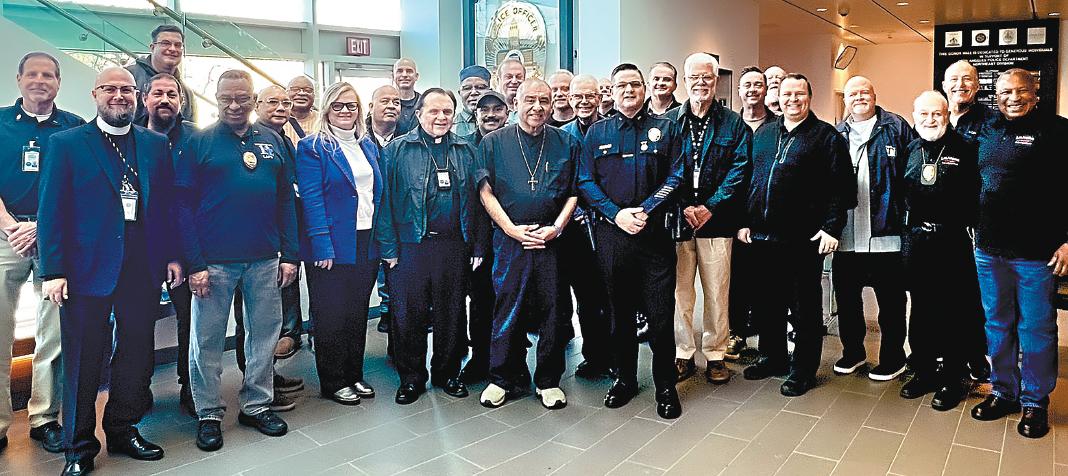
How long has it been around?
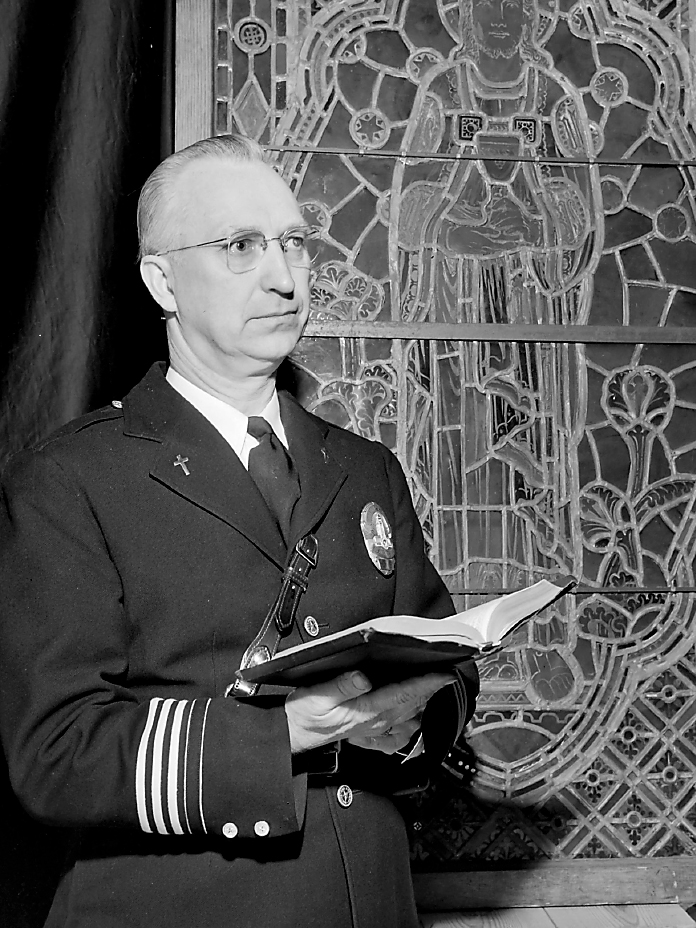
Officer III Michael McCarty: It goes way back. In 1945, a Los Angeles Police Dept. Motor Transport Division mechanic, Bill Riddle, volunteered to serve as a Chaplain during the police funerals and special events. He was also part of the American Legion of Chaplain Corps. More and more of these responsibilities eventually occurred, and Assistant Chief Bob Vernon, had taken over many of those duties. Bob did the job for a while and realized he would need to recruit other Officers, including Sgt. Jerry Powell, and Ralph Evans, to help. Eventually Bob Vernon, was limited on time, so he turned over all duties to Jerry Powell as the lead Chaplain, and he ran the Dept. Chaplain Corps for some time. Jerry was appointed by Chief Daryl Gates. Sgt. Powell retired with Chaplain badge No. 1.
When I took over the program in 2007 as the Coordinator, it was unique for a police department to have a sworn Officer dedicated full-time to this position. That’s how unique the program is – they’re dedicating full-time people to it. I do believe through some research that our Chaplain Corps is the largest in the nation, with approximately 50 members, and a dedicated assigned Officer to it solely.
 Dual Roles
Dual Roles
If you’re a sworn Officer and also in the Chaplain Corps, how do you judge the use of your time? You’re in Traffic or Homicide or whatever it might be, but then you get a special call to provide Chaplain services? How does that juggling of duties work?
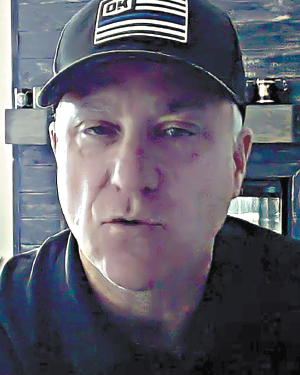
Sgt. Eric Rogers: Hi John and Robert, I’m a Sergeant, so my supervisor duties are at Metropolitan Division’s Mounted unit. Being a Chaplain is an ancillary job. Mike is very good as a Chaplain Coordinator in giving us details in advance of what we could be doing. I have open line of communication with my chain of command so that they know how important my Chaplain duties are, and you just have to balance your time. If something exigent comes up, which has happened from time to time, where maybe an Officer has been involved in an accident or there’s a catastrophic accident where an Officer’s been shot and I’m working at that time, then I pretty much will drop everything and attend to that Chaplain call. My command is very willing to accept that, because that takes precedence over our day-to-day activities. We handle those things, and if it’s something that I can’t handle because I’m in training that day or something else, we have plenty more competent Chaplains who can handle the duties. But I haven’t ever found it that difficult to balance just because of the understanding from the command staff.
Let’s say an Officer has a car accident on his way home or there was an Officer who was shot, Mike might call me and say, “Hey, Eric, are you working?” If I am, then I can get to the hospital and find out what the needs are of the particular incident and the Officers, and then I can help coordinate the response from the Chaplain Corps. I’m a Christian Chaplain but I can find out if a different faith background is more applicable. We know how to work with hospital staff and hospital Chaplains. Our immediate concern at that time is not administrative. It’s not the department. It’s taking care of the well-being of that Officer and his or her family and taking care of them during this catastrophic moment.
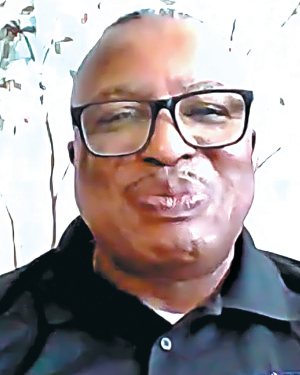
Chaplain Kenneth Crawford: I believe all of the Commanding Officers in the department are very sensitive to the fact that when a crisis moment happens, they are gracious enough to give us permission to respond, and bring a holistic response to the Officers and their families in their time of need. We have a great system.
Communication seems critical.
Sgt. Eric Rogers: Yes, and that’s where Mike McCarty comes in. He’s the hub.

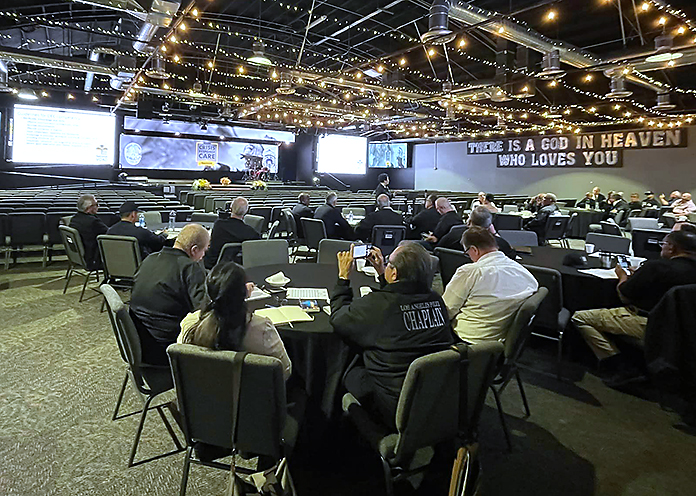
Training and Certification
Are the positions paid?
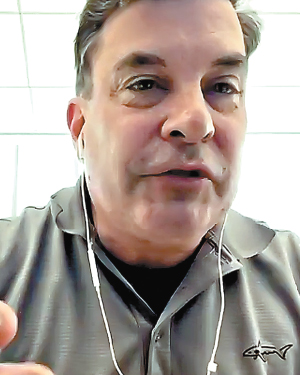
Officer III Michael McCarty: We have sworn and civilian Chaplains. They’re all on equal level administratively and all considered Chaplains. The sworn are paid as part of their regular police duties, and they’re issued different equipment because they’re Police Officers. The civilian Chaplains are volunteers.
When a candidate is interested in becoming a Chaplain, whether sworn or civilian, they are recommended to me. I will then schedule an interview with them through the Chaplain Advisory Board. The board will review their qualifications to see if they are qualified to be a Department Chaplain. Department Chaplains are solely for the use for our department civilian and sworn employees. There is another program called a Clergy Council; that’s for the use of our Police Dept. to reach out through pastors and clergy to work with the community. That’s a totally different program.
Once the Chaplain is approved, whether sworn or civilian, they will then go through a background process. It’s a lengthy one, to look into their criminal history and then check their qualifications to make sure that they are a qualified, ordained minister. Once they’ve passed that background check, they are then appointed by the Chief of Police as a department Chaplain. They’re issued a certain amount of equipment such as an ID card that gets them into facilities, as well as a department badge. They get a bulletproof vest so they can go out on ride-alongs once a month. They are asked to do a minimum of eight hours a month, minimum. All of them do way more than that to volunteer their time so they get to know the Officers, so they earn their trust and minister to them. There is a two-year probation time for the beginning Chaplains once they’re assigned to a Division, and they are mentored by a senior Chaplain. Once they’re done with their probation, then they’re free to minister on their own as they see fit.
They have an eight-hour quarterly training session every year that’s mandatory.
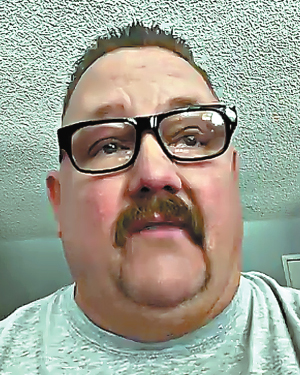
Fr. Michael Cooper: We all come from different faith backgrounds, we all have different training and experience. I’m a Retired Policeman, so I bring a little different set of skills to the table. The scheduled training four times a year covers everything police-related from critical incidents and active shooters to suicide. It really covers the gamut of what we may be called in to assist with and to handle with. And we’ve already gone through an academy. Our ongoing training is in-house, and it really is good stuff.
Does the department expect you to already be trained in your faith tradition? Is that sort of training mandatory before you become an LAPD Chaplain?
Fr. Michael Cooper: To become a Chaplain you have to be either validly ordained by your faith tradition or licensed or certified or have some pedigree that says you are an official minister. It really depends on the faith tradition. We have our first Daoist member who practices the Daoist faith, and in the Daoist faith there is no ordination process. You align yourself with a Daoist monk, and the faith is passed down that way. My faith tradition includes years of study in seminary and ordination. There’s always continuing education within the faith tradition, too, and as a priest we are certainly encouraged by our faith tradition to do continuing education and to constantly study the Scriptures and learn new things. The thing that I think is really amazing is that so much of the training that the LAPD provides for us also assists me in my own parish and in my own ministry within my faith tradition. They piggyback on each other. To be a Chaplain you have to be validly ordained or certified or something in your faith tradition.
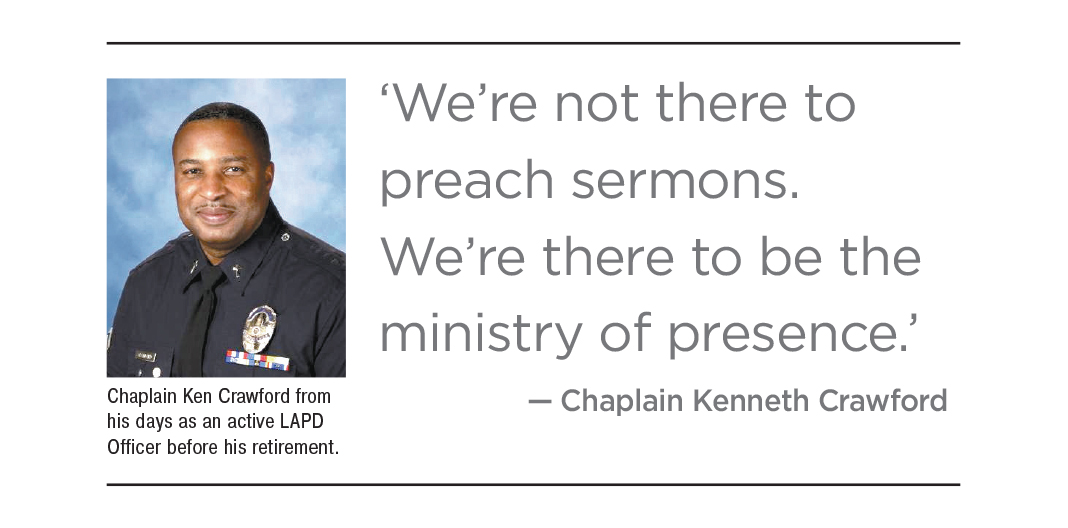
Which faith traditions are represented by the LAPD Chaplain Corps?
Chaplain Kenneth Crawford: We have Catholic priests, Rabbis, Christian pastors and various other faiths that are represented in the LAPD Chaplain Corps. I would say not every faith is represented, but for the most part, we are equipped to meet the needs of our rank and file.
Do you see the faith traditions represented also growing and widening? Are you seeing new faith traditions coming in and wanting to be a part of the Corps?
Sgt. Eric Rogers: I wouldn’t say we necessarily have new faith traditions coming in. If you look at the makeup of the Police Dept. and probably the City of Los Angeles, the vast majority would be considered Catholic due to a high majority of Hispanic Officers being Catholic. So do we have any other faith backgrounds coming in, more than we have already? Not necessarily, but Mike stays on top of the makeup of the different faith backgrounds. It’s essential that we have the proper representation. We have it covered.
Got it.
Fr. Michael Cooper: Any faith that comes to the table that has a desire to be a part of our ministry team, we will always accept an application. We will always accept them to have an interview with our board. Should they pass that interview, they would be recommended for the background portion of the selection process. No faiths would be rejected. All faiths would be encouraged to apply.

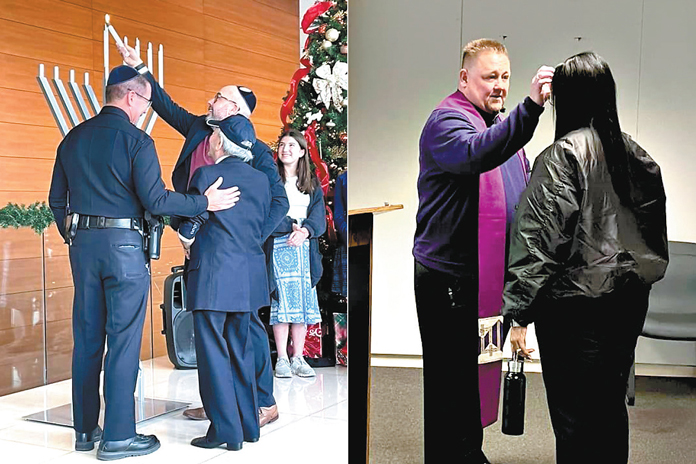
A Calling, and Faith Traditions
What kind of a person wants to be, or is called to be, a Police Chaplain?
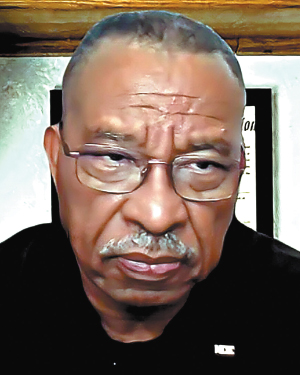
Rev. Dr. Henry Ellis: The kind of person who I believe would be a good Chaplain is someone who can look beyond the realm of their immediate environment and be able to reach out in the uttermost, specifically those who have a responsibility over our communities and be able to give them a sense of hope without proselyting them into that particular faith. Hope is something that’s common to all men and all women, to everyone, and so there should be a desire to be able to be there for them. For me, I gave it a special name that I could identify with that can encompass everyone, anyone who’s there to serve and protect our community. He or she has to be selfless, because it’s a volunteer position. It calls for the most sincere and dedicated commitment to do this particular work without compensation.
Chaplain Kenneth Crawford: It’s a person who understands the needs of others, and understands the process of what people have to go through in the crisis moment. The very nature of the word “Chaplain” means “a Chapel.” When people come to you for whatever advice or whatever counseling, you’re that conduit between them and God. I hope there’s a desire to give that spiritual counseling, that spiritual oversight, to put them at ease and keep them calm in a moment where through no fault of their own they’re having the worst possible day in their life. You can be the ministry of the Divine to them, not to preach at them. We’re not there to preach sermons. We’re there to be the ministry of presence and to hold their hands and guide them in faith and love and support them as best we can.
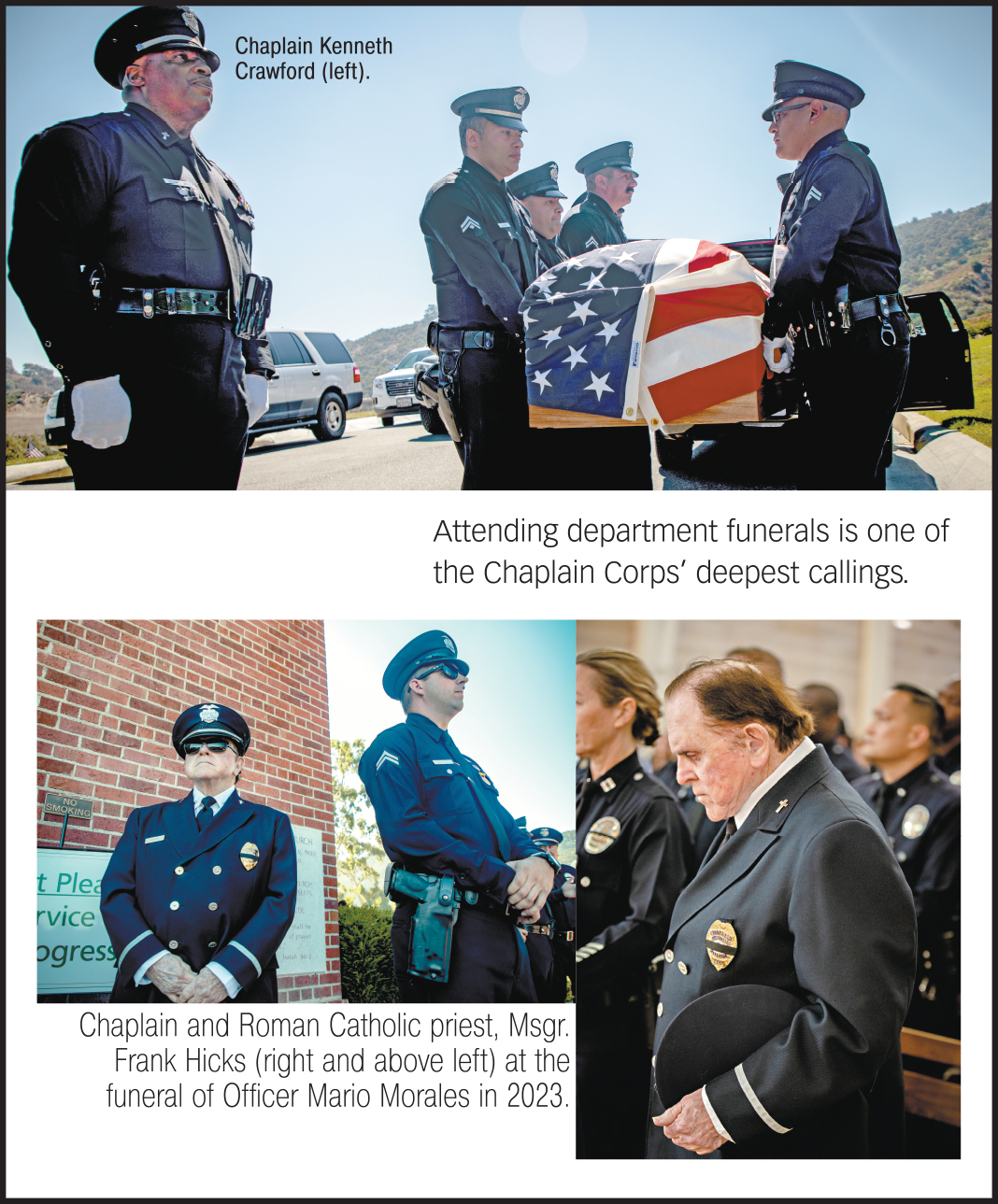
Fr. Michael Cooper: It really doesn’t matter what faith tradition you come from. I rarely wear a collar into the division. I’m usually in a polo, but sometimes for new Officers it could be a stumbling block. If an Officer asks me what faith tradition I’m from, of course I tell them, but most don’t care. They just know that you’re the Chaplain. Obviously there are nuances to that. If it’s a Catholic family and they want a Catholic funeral then of course I tell them. But on the general ministry of presence, they just care that you’re their Chaplain and you’re there. We are not allowed to proselytize. We are not allowed to push our own traditions or teachings. We have to sign a waiver to allows us to pray in public. As a Christian I can’t evoke the name of Jesus. It has to be generic because the department is sensitive to other faith traditions. You may have Jews and Muslims and other faith traditions in the crowd. God can be God. God is Father, but we can’t be specific in our own faith tradition. That’s one of the reasons that the Chaplain Corps has been so successful. I would say that not one faith tradition dominates the Chaplain Corps. We have everybody, and our board here is a great representative of that. We’ve got a couple priests. We’ve got some Protestant Chaplains. We’ve got a rabbi. When it comes down to it, the troops are happy that the Chaplain’s there. They don’t care what faith tradition you’re from.
Rev. Dr. Henry Ellis: We’re not here to enforce religious beliefs. As a Chaplain, I know what I’m called to do.
 Watching Over Those Who Watch Over
Watching Over Those Who Watch Over
The motto of the Chaplain Corps is to serve those who protect and serve. You watch over those who watch over others.
Chaplain Kenneth Crawford: Right. As an Officer for 42 years now, 34 active years and now eight reserve years, you see a lot of crisis moments in your career. You see a lot of very distasteful and tragic moments, and you also get to see the same in the lives of the first responders. The one thing I do every single day in devotions is to pray that God watches over the first responders and their families. The Bible calls us to be a watchman, and a watchman means that God calls you to be a person who prays for the wellbeing of the people. So I pray over the LAPD and their families every single day, but I also pray for all City employees and all people across the United States daily in my devotions. It’s critically important, I believe, that as the first responders go out and perform their duties daily, that we provide spiritual protection over their lives, over their wellbeing, and over their families. I subscribe to an app called the Officer Down Page, and every single day I get a text message about some Police Officer across the United States who has lost their life in the line of duty. We all need to see that, downrange, bad things are going to happen. The one thing that we all can do is pray for their wellbeing and their protection.
Rev. Dr. Henry Ellis: I serve at Northeast Division, and I’ve discovered at Northeast there are three ideas that resonate across the ethnicity of people and what they believe. Those three ideas are presence, peace and purpose. Every person ought to take God with them wherever they go. Chaplains are ministers of God. We have to have the purpose to protect and serve. I encourage them not to ever be at rock bottom. We want them at the top or the center in their training and personal lives. “You are still a spiritual person,” I tell them. Lay hold of your spirituality so that both the cop and the citizen can go home at night.
 Steadfast, but Not Hidden
Steadfast, but Not Hidden
You work significantly behind the scenes and not necessarily in the spotlight. Is that okay with you?
Fr. Michael Cooper: I wouldn’t necessarily say we work behind the scenes. We talk a lot about what we call a ministry of presence, of just being there. But when there’s a major incident, especially an on-duty death, we’re very much in the forefront. We don’t call attention to ourselves; we just do what we need to do. If I have an Officer who has something going on, I certainly will pray for him personally, but I take it back to my parish, too. We add them to our Prayers of the Faithful, so we pray for that individual at every Mass that’s celebrated in the parish. We just very, very humbly go on doing what we do, and sometimes that’s very much in the forefront. St. Francis of Assisi had a great quote. He said, “Preach the gospel always, and if necessary, use words.” Without even having to open our mouths, we are a testament of our belief and our faith and our commitment to the men and women of the Los Angeles Police Dept.
Officer III Michael McCarty: When I was out in the field as a Police Officer, there was always a man sitting at the back dock of the station. He wore his Pittsburgh Steelers hat and was nice and smiling. I always wondered what he was doing there. His name was Dale Rose. Turns out he was a Chaplain. I didn’t know what Chaplains did, and I was a 10-year Police Officer at this time. It brought me solace to know that this man was there day in and day out volunteering his time, and he would just say “Hello,” and it wasn’t anything more than that. It was the coolest thing, the neatest thing, that he was there, just being present. I grew to love this man and his family.
But another point on this – we have a police psychologist team, and we work hand in hand with them. We share information; there are two sides, the psychologist field and the theological field, helping the Officers. But I’ll tell you this as an Officer, and I’ve heard this time and time again: When Officers get into trouble or need help, they’re ordered to see the psychologist. I’ve heard people say, “I’d rather see a Chaplain than be ordered to go see the psychologist.” That means there’s more of a comfort level with the Chaplains throughout the department than being ordered to go see the psychologist. Clearly I’m not putting them down by any means. They’re vitally important, but there’s more of a comfort level going to
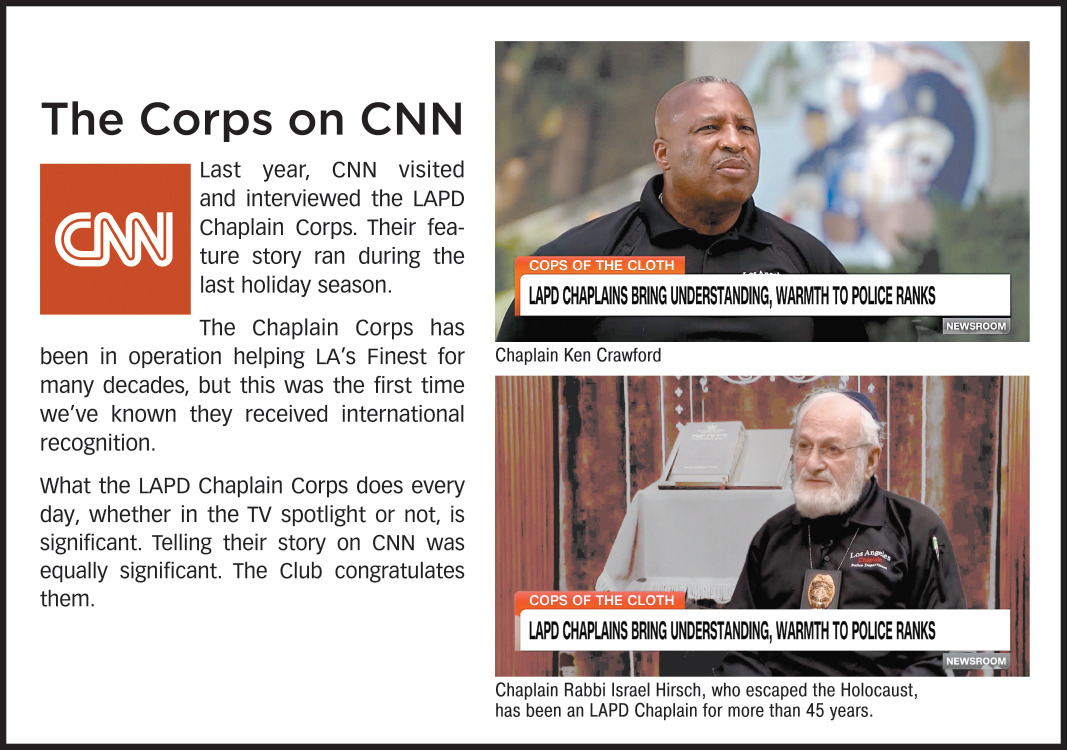
Talk about situations that you have been through in helping Officers in the moments of their struggle, to find the meaning in what they do.
Rev. Dr. Henry Ellis: There was one incident back in 2013. I was on a ride-along with one of the supervisors at Northeast, and we went to a hotel or apartment where a man had died inside the bathroom. I went up with the supervisor, and then the supervisor ran up to me and said, “I need you to help comfort the wife of this deceased person who was in the bathroom, because she’s about to just go to pieces.” When I ministered to the wife and she finally calmed down, her daughter took her into another room. The supervisor told me how much he appreciated my help. I don’t look for accolades but when you get one it sure does feel good, and it made me feel like I was there for a real purpose and valued. That was just one incident. But, certainly many others.
Sgt. Eric Rogers: One time when I was working and I was assigned to Hollywood, Mike called me, and I could tell he was frantic. He said, “An Officer’s toddler fell into a pool during a birthday party” and was unresponsive. They were Life-Flighting the child to Children’s Hospital Los Angeles. Could I get over there and meet with the family as soon as possible? That’s when you start praying. What words could I add? There are no words, but we go back to what Fr. Cooper said, the ministry of presence. I was determined to get over there and serve that family in whatever capacity I could. I walked into the emergency room, and I saw a young couple. The mom had a little tiny baby in her arms, and another kid was running around in the hospital room. By the time I had gotten there they had recovered the young boy, and he was without any kind of injury or anything else. He was fine. I was just so happy that, after praying, “God, do your work,” this family knew that we showed up there for them. That we were present.
 ‘We Are Human’
‘We Are Human’
What are the unique challenges for maintaining your own mental and spiritual health?
Rev. Dr. Henry Ellis: Good question.
Sgt. Eric Rogers: That’s a great question. I remember the first time an Officer asked me that, when he knew I was a Chaplain. He caught me off guard. What do I do to stay plugged in? For me it’s staying grounded in my church, and of course in my personal time as well, It’s an essential question. We can help others grow only as much as we’re spiritually mature, so we have to stay on top of our game. We have quarterly training with all the Chaplains. It’s vital in my own personal time, too, to stay in the Word, the Bible, as well.
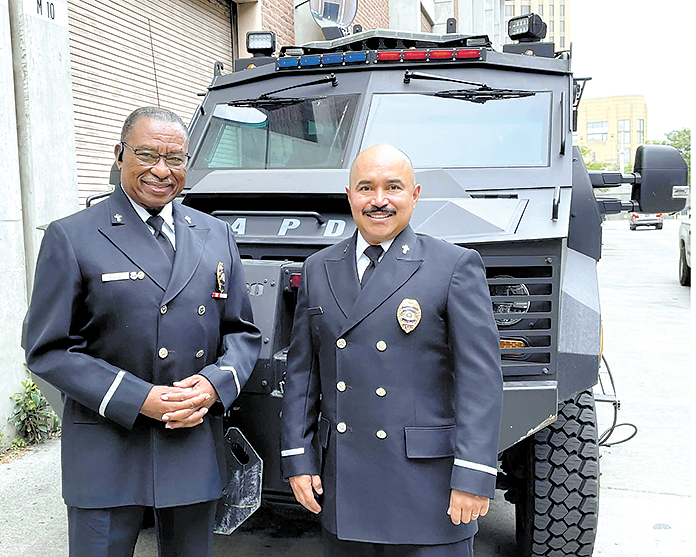
Rev. Dr. Henry Ellis: I’ve spoken to Ken Crawford about the wellness of the Chaplain Corps as we protect and serve. We’re right out there with the Officers, and we are also just as human as anyone else. I lost my wife last year in May and so it came full circle for me. I’m thankful that I’m serving with brethren who really help me a lot – Chaplains mentoring and Chaplains coming to the ministry of other Chaplains.
I stay connected by constantly reading, and I even had to go back over some of the training that I have had for the Police Officers and use it for myself. So I rely on constant prayer and constant fellowship with other brothers, and expressing yourself about what’s bothering you. Staying grounded mentally.
Officer III Michael McCarty: In their quarterly training sessions, which I coordinate, they speak about some of the cases that they handle to let out of some of what they go through. We assigned a Chaplain to Van Nuys for a suicide and she wasn’t quite sure what to say, but she felt comfortable enough to call me and Sgt. Rogers to help her deal with this. The Chaplains are not alone.
In addition, at the end of the year the department puts together a Chaplains’ banquet. Somewhere between 180 to 200 people attend. We present a Chaplain of the Year Award for the Most Prestigious Chaplain, the Chaplain who’s out there doing the most, out there doing a lot. Every year it’s a hard pick because they all do so much.
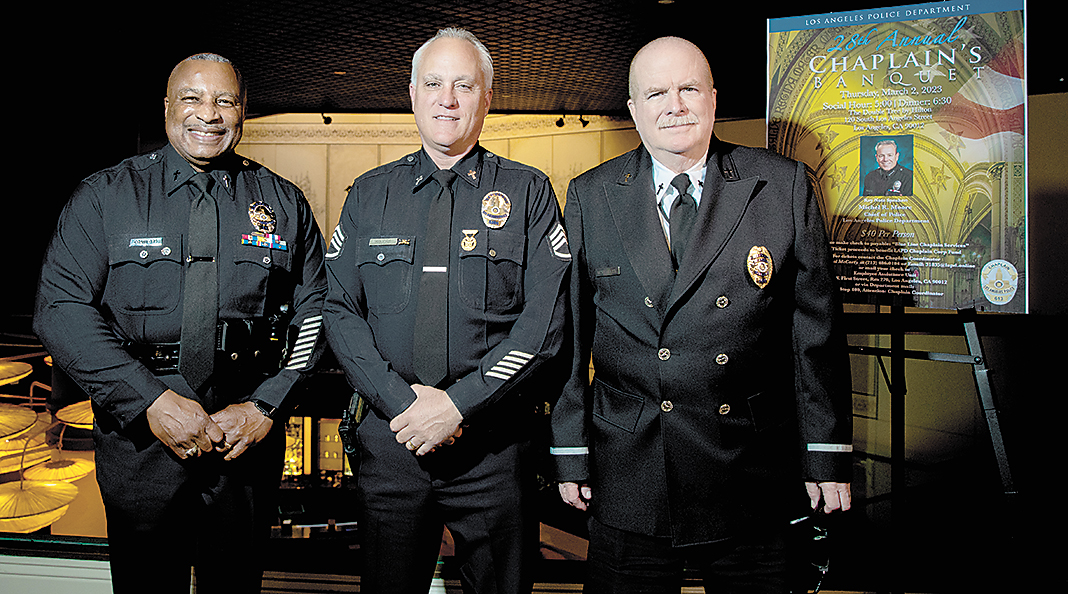
Chaplain Kenneth Crawford: We teach a class called Taking Care of the Caregiver, in which we address a lot of different incidents or circumstances that can arise from the crisis moments that are handled by our Chaplains. In that training we talk about past incidents that have happened in the lives of the Chaplain that could affect how you maintain calmness in handling certain situations. We need to recognize our limitations. If we’re not equipped for that particular call-out, we need to be honest with ourselves and have the courage to acknowledge it, and defer to another Chaplain.
Debriefs are important, too. We debrief every single incident to become more proficient at our ministry and make whatever adjustments, so that we’re prepared for the next incident.
Second, it’s important that we always have a person to whom we’re accountable, and that person could be another Chaplain or a senior pastor. I can call the Pastor at any time for support, or to request prayers over what is being handled. That has always invigorated, encouraged and empowered my spirit to be that person of calm, that God would give me the necessary words and temperament to be that chapel.
 In Service
In Service
What do you love about being a Police Chaplain?
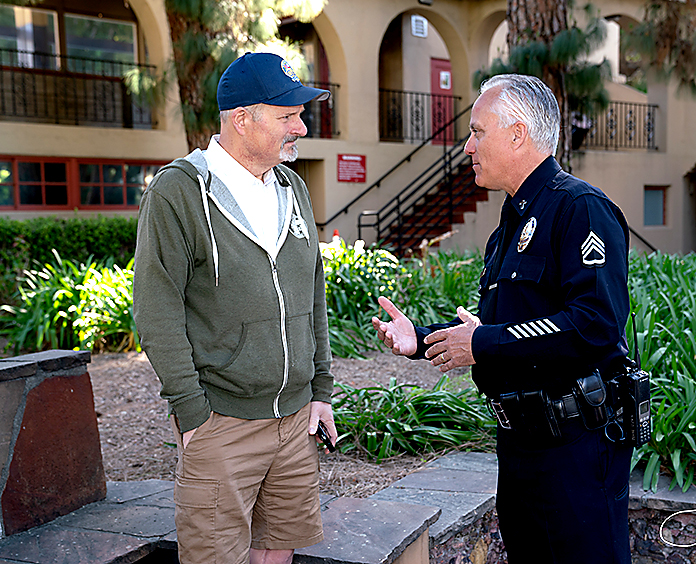
Sgt. Eric Rogers: There’s nothing I’m more passionate about than taking care of the Officers and their families. I would want the same for my family. If something were to happen to me, my wife needs a Chaplain there. She needs a man or woman of God to take care of her. My dedication and affection are for the men and women of the Los Angeles Police Dept. and their wellbeing. That’s the first and foremost reason why I serve as a Chaplain.
Rev. Dr. Henry Ellis: I gave myself a personal assignment as a Chaplain that coincides with the mission of the Chaplain Corps for the Los Angeles Police Dept., and I call it my Philippian Jailer Ministry. It is a biblical story of a jailer assigned to guard some prisoners. One night a great earthquake happened, and all the doors were opened. In those days, if a prisoner escaped, the jailer could lose his life. The Philippian jailer was going to take his own life. Two of his prisoners, one named Paul, told him, “Do not harm yourself, for we are all here.” Because his life was spared, he saved his whole household. The biblical story revealed I had a much higher calling to serve the men and women in law enforcement so they too can understand there is a God beyond what they can see with their physical eyes. That’s a real higher calling.
Chaplain Kenneth Crawford: I have served in the Los Angeles Police Dept. for the past 42 years, and during that time, I have witnessed many tragic incidents in my own personal life and the lives of a number of personnel. My strong faith in God has given me the resiliency and strength to overcome the tough times. I am privileged to come alongside my fellow colleagues in whatever situations that they face, to comfort them and help guide them to a place of spiritual peace.
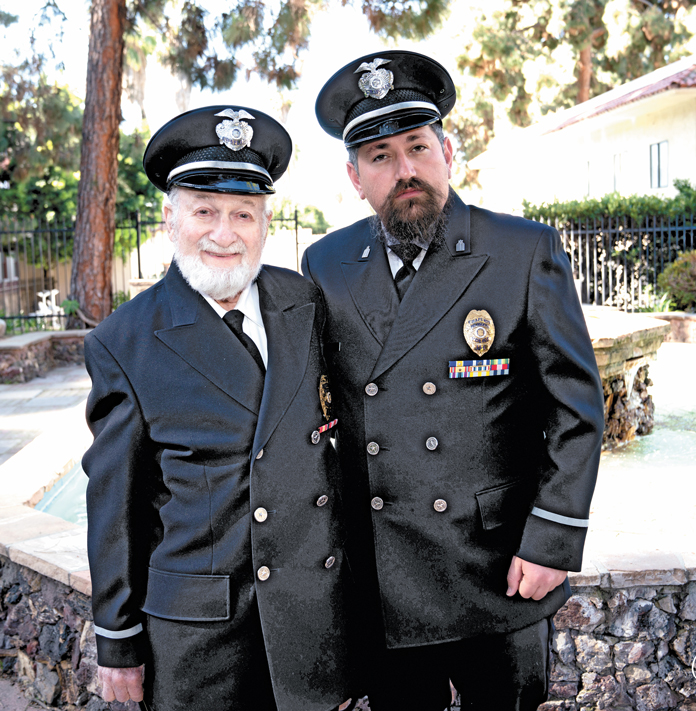
Fr. Michael Cooper: It’s always nice to feel needed. One of the things that’s always touched me is I’ve handled Officer suicides. I’ve handled two children of Officers who have committed suicide, and obviously it’s a really hard time for everybody. I pray every day that we will never have another Officer suicide again. When I was a Sheriff’s Deputy, I had no idea about Chaplains. I didn’t know the Chaplain at Carson or at Firestone. I didn’t have the need of a Chaplain, so now to be part of a Chaplain Corps is really a blessing.
For me it’s those personal moments seeing families in their vulnerability and in their grief. I hope we’re not afraid to show our vulnerability. We’re not afraid to weep with the Officer and to be moved when we lose somebody in the line of duty. The personal part of it is what appeals to me, and I always think it’s a blessing that God allows me to be a part of these things. As a Retired Police Officer, it’s both of my lives together, my life as a cop and my life as a minister. It’s amazing how God prepares you for everything that He has stored up for you.
Everyone, thank you all for sharing your very personal stories with Club Members. We appreciate you and thank you for your service.
Officer III Michael McCarty: Thank you very much.
Sgt. Eric Rogers: Thank you.
Chaplain Kenneth Crawford: Take care.
Fr. Michael Cooper: Bless you all. •
|
BEHIND THE SCENES
|


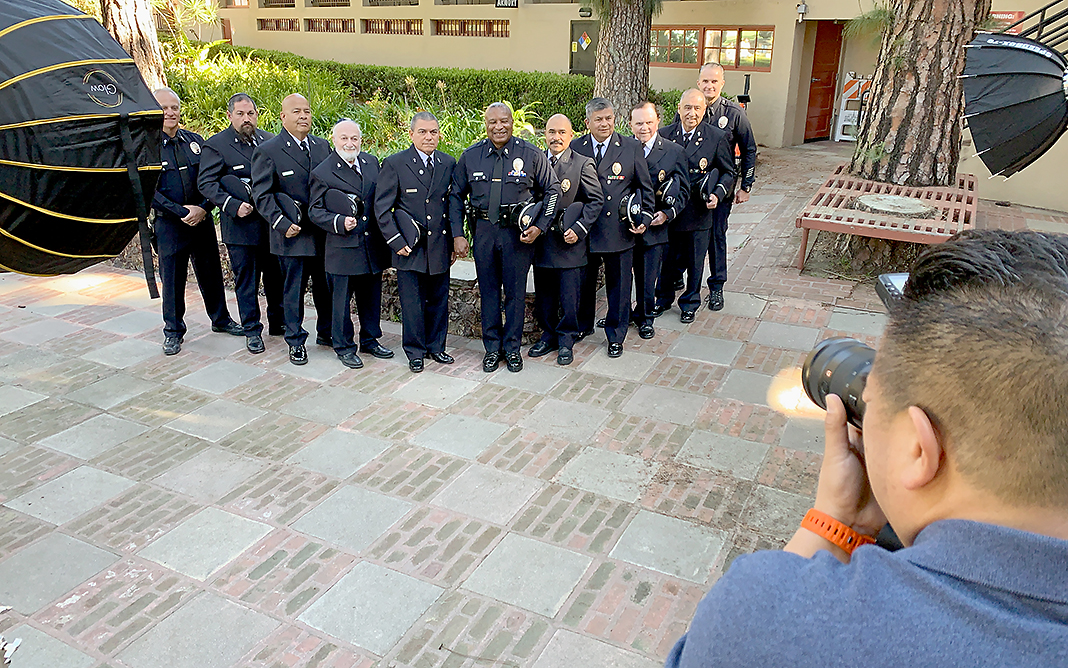 Club
Club 
